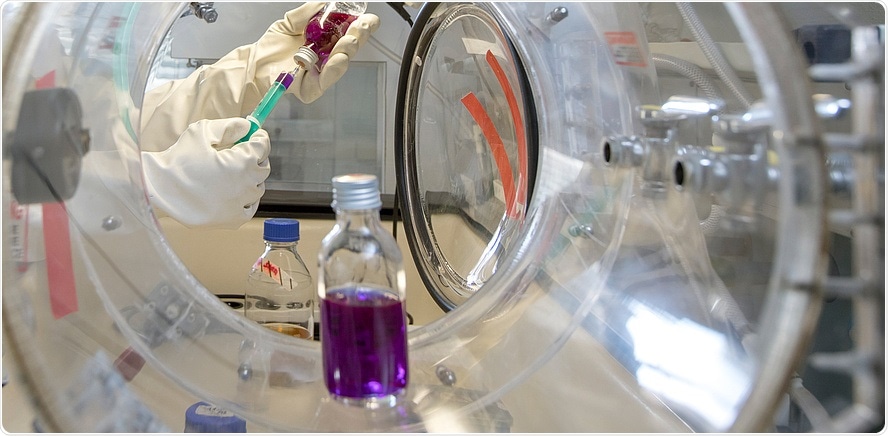The chemical substance class of nucleosides is attracting a great deal of interest, and this can be attributed to the ongoing COVID 19 pandemic and the corresponding active search for vaccines and therapeutics.

The Graz researchers are the first in the world to demonstrate “YeiN,” an enzyme that is a suitable biocatalyst for the production of C-nucleosides, the basic building blocks of RNA. (Symbolic photo from enzyme research). Image Credit: Lunghammer - Graz University of Technology.
Both synthetic and natural nucleosides have an antiviral effect and can serve as building blocks for ribonucleic acids, or RNA. When integrated into RNA, new interactions inside the macromolecule lead to positive consequences for biological effectiveness and stability.
The molecular family of carbon (C)-nucleosides, relevant to the field of medicinal chemistry, is specifically in demand. These nucleosides vary from nitrogen (N)-nucleosides—which occur naturally and more frequently and are the traditional building blocks of RNA—in such a way that the sugar is attached to the supposed nucleic base.
C-nucleosides have a carbon-carbon bond rather than a carbon-nitrogen bond. This carbon-carbon bond is biochemically relatively more persistent and imparts a longer biological half-life to the active ingredients.
Now, for the first time, two scientists from the Graz University of Technology and the acib competence center (Austrian Center of Industrial Biotechnology) have succeeded in biocatalytically synthesizing C-nucleosides by using enzymes. These solid results have been published in the Nature Communications journal.
Yes to the enzyme “YeiN”
Bernd Nidetzky, Head of the Institute of Biotechnology and Bioprocess Engineering at Graz University of Technology and also the Scientific Director of the Austrian Centre of Industrial Biotechnology (acib), and Martin Pfeiffer from acib identified and defined the enzyme, called “YeiN,” in a study. This enzyme can bind the two nucleoside building blocks, that is, uracil and ribose-5-phosphates, through a particular carbon bond.
Nidetzky and Pfeiffer are the first investigators in the world to show an enzyme that serves as an appropriate biocatalyst for synthesizing C-nucleosides.
Efficient and eco-friendly production
Leveraging the catalytic power of the “YeiN” enzyme, the Graz-based firm successfully created many derivatives of the crucial C-nucleoid pseudouridine. The company was also able to demonstrate that one of these derivatives can be integrated into RNA and therefore allow for RNA modification.
This is specifically pertinent for producing RNA-based therapeutic products, because the addition of pseudouridine into the RNA enhances its half-life and stability, and thus improves the efficacy of therapeutic RNA, for example, a vaccine.
In our study we show that pseudouridine can be produced biocatalytically. Compared to a purely chemical synthesis, this is a much more efficient way, since fewer reaction steps and no toxic chemicals are required. The biocatalytic production of C-nucleosides is therefore a very strong, elegant alternative to classical chemical synthesis and even superior to it in terms of efficiency.”
Bernd Nidetzky, Head of the Institute of Biotechnology and Bioprocess Engineering, Graz University of Technology
Based on the results published in the Nature Communications journal, studies can presently be performed to extend the substrate range of the “YeiN” enzyme. The objective is to realize the biocatalytic synthesis of more relevant C-nucleosides.
RNA vaccines
The first in-depth vaccination of RNA vaccines against the COVID-19 disease has been ongoing for a few days. These entirely new vaccines contain genetic data about the pathogen and cause cells to generate a viral protein, which is subsequently presented to the immune system.
The resulting immune reaction shields the body from a real viral infection. If a person is already infected with the virus, antiviral drugs can inhibit the pathogen from multiplying.
Remdesivir is a C-nucleoside-based drug and contains these required antiviral properties. It is effective against several RNA viruses, such as Ebola and coronaviruses. The EU has given conditional approval to this active ingredient for treating COVID-19 patients.
The biocatalytic synthesis of C-nucleosides could offer more impetus for this new hope and also for C-nucleoside-based RNA vaccines.
Source:
Journal reference:
Pfeiffer, M & Nidetzky, B (2020) Reverse C-glycosidase reaction provides C-nucleotide building blocks of xenobiotic nucleic acids. Nature Communications. doi.org/10.1038/s41467-020-20035-0.